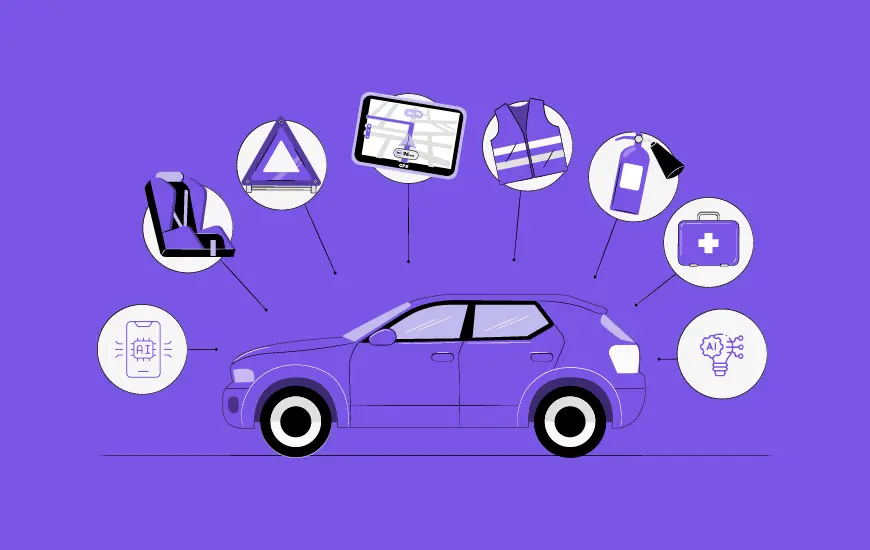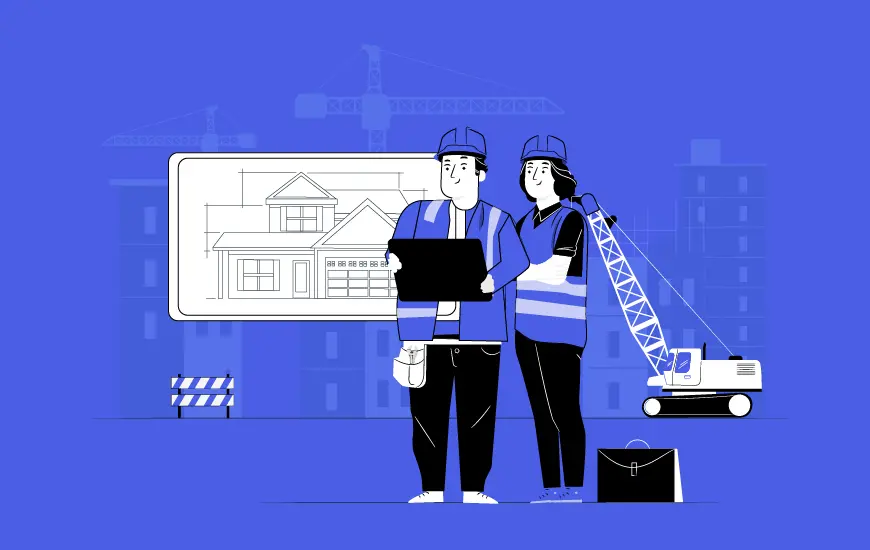
Artificial Intelligence (AI) is driving significant advancements across industries, reshaping traditional practices, and paving the way for innovation. Two sectors where AI is making substantial strides are the automotive industry and construction. From autonomous vehicles to smart building solutions, the applications of AI are transforming these fields, offering enhanced efficiency, safety, and cost-effectiveness. In this article, we delve into the role of AI in the automotive industry and AI in construction, exploring their transformative potential and key applications.
AI in Automotive Industry: Driving the Future
The AI in automotive industry revolution is characterized by the integration of intelligent systems that enhance vehicle performance, safety, and the overall driving experience. AI-powered solutions are transforming how vehicles are designed, manufactured, and operated.
Key Applications of AI in Automotive Industry
- Autonomous Vehicles
- AI is the backbone of self-driving cars, enabling vehicles to navigate roads, recognize traffic patterns, and avoid obstacles.
- Example: Companies like Tesla and Waymo use AI for real-time decision-making in autonomous vehicles.
- Impact: Safer roads and reduced human errors in driving.
- Predictive Maintenance
- AI systems analyze vehicle data to predict potential malfunctions and recommend timely maintenance.
- Example: AI-powered diagnostic tools in modern vehicles alert users to engine or tire issues.
- Impact: Lower maintenance costs and improved vehicle reliability.
- Driver Assistance Systems
- AI enhances safety through features like adaptive cruise control, lane-keeping assistance, and automatic emergency braking.
- Example: Advanced Driver Assistance Systems (ADAS) use AI to monitor surroundings and assist drivers.
- Impact: Fewer accidents and enhanced driving comfort.
- AI in Manufacturing
- The automotive manufacturing process benefits from AI in areas like quality control, inventory management, and robotics.
- Example: Robots powered by AI automate welding and assembly tasks with precision.
- Impact: Faster production cycles and reduced operational costs.
- Personalized In-Car Experiences
- AI enables customized in-car experiences through voice assistants and predictive analytics.
- Example: Virtual assistants like Alexa Auto personalize music, navigation, and climate settings.
- Impact: Enhanced user satisfaction and convenience.
Benefits of AI in Automotive Industry
- Improved Safety:
- AI systems reduce human errors and enhance vehicle safety features.
- Cost Efficiency:
- Predictive maintenance and manufacturing automation lower costs.
- Sustainability:
- AI optimizes fuel efficiency and supports the development of electric vehicles.
- Enhanced User Experience:
- AI-powered personalization transforms driving into a seamless experience.

AI in Construction: Building Smarter
The integration of AI in construction is revolutionizing an industry traditionally reliant on manual processes. AI technologies are streamlining operations, enhancing safety, and driving sustainability in construction projects.
Key Applications of AI in Construction
- Project Planning and Scheduling
- AI tools analyze project requirements to create efficient schedules, allocate resources, and predict potential delays.
- Example: Platforms like ALICE use AI to optimize construction timelines.
- Impact: Timely project completion and reduced overhead costs.
- Autonomous Construction Vehicles
- AI-powered vehicles perform tasks like excavation, grading, and material transportation with minimal human intervention.
- Example: Autonomous bulldozers and loaders improve site efficiency.
- Impact: Reduced labor costs and improved precision.
- Construction Safety
- AI systems monitor sites to identify hazards and ensure compliance with safety regulations.
- Example: Wearable devices powered by AI alert workers to unsafe conditions in real time.
- Impact: Fewer workplace accidents and improved employee well-being.
- Building Information Modeling (BIM)
- AI enhances BIM by identifying design flaws and optimizing building performance.
- Example: AI-driven tools simulate construction scenarios for better planning.
- Impact: Higher-quality structures and reduced rework.
- Material Management
- AI optimizes material usage by analyzing designs and predicting requirements.
- Example: Smart systems track inventory and suggest cost-effective alternatives.
- Impact: Reduced waste and improved resource utilization.
- Drones and Surveillance
- AI-powered drones survey construction sites, monitor progress, and ensure compliance with project plans.
- Example: Drones capture aerial images and create 3D site maps for analysis.
- Impact: Enhanced site monitoring and improved decision-making.
Benefits of AI in Construction
- Increased Efficiency:
- Automation and predictive analytics streamline workflows.
- Cost Savings:
- AI reduces material waste and operational inefficiencies.
- Enhanced Safety:
- Real-time monitoring minimizes workplace risks.
- Sustainability:
- AI promotes eco-friendly building practices.
Bridging AI in Automotive Industry and AI in Construction
Although distinct, the automotive and construction industries share common ground in their adoption of AI to enhance efficiency and innovation. Key intersections include:
- Predictive Analytics:
- AI predicts maintenance needs for vehicles and machinery in both sectors.
- Impact: Reduced downtime and improved operational reliability.
- Autonomous Technologies:
- Self-driving cars and autonomous construction vehicles showcase AI’s potential in automation.
- Impact: Safer and more efficient transportation and site operations.
- Sustainability Initiatives:
- AI supports eco-friendly practices like energy-efficient vehicles and sustainable building designs.
- Impact: Reduced carbon footprints across industries.
Challenges of AI Integration
While the benefits are vast, integrating AI into the automotive and construction industries poses challenges:
- High Costs:
- Developing and deploying AI systems require significant investment.
- Data Privacy Concerns:
- Collecting and processing large volumes of data raises security issues.
- Skill Gaps:
- A shortage of AI expertise hinders implementation.
- Adaptation Challenges:
- Transitioning from traditional practices to AI-driven workflows takes time and training.
Future Prospects
The future of AI in automotive industry and AI in construction is bright, with advancements promising further transformation:
Automotive Industry
- Expansion of autonomous vehicle technology for personal and commercial use.
- Greater focus on AI-powered electric vehicles to promote sustainability.
- Enhanced vehicle-to-vehicle (V2V) and vehicle-to-everything (V2X) communication for smarter cities.
Construction Industry
- Wider adoption of 3D printing integrated with AI for faster and more precise construction.
- Increased use of AI-driven robots for on-site tasks.
- AI-powered solutions for smart city planning and infrastructure development.
Conclusion
Artificial intelligence is revolutionizing industries with transformative applications, and its role in the automotive industry and construction is no exception. From autonomous vehicles and predictive maintenance to smart construction and sustainable practices, AI offers limitless opportunities for innovation and growth.
As businesses and industries embrace AI, they unlock efficiency, safety, and sustainability. The future belongs to those who leverage the power of AI to overcome challenges and redefine possibilities.

